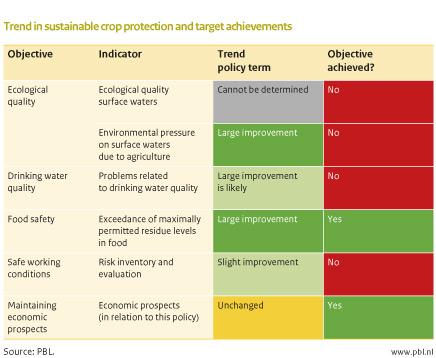Evaluation of the Dutch policy document on sustainable crop protection
Water quality has improved due to legislation on crop protection. However, policy objectives for ecological quality of surface waters and drinking water, as set in the Dutch policy document on sustainable crop protection, have not been achieved. In addition, concentration levels of pesticides remained higher than water quality standards permit, at over half of all the measuring locations. Policy objectives were achieved for food safety and the economy. The largest concerns relate to occupational safety, especially in horticulture.
Crop protection has become more sustainable, but not all policy objectives have been achieved
As a result of efforts made by growers, manufacturers of pesticides, water boards and government administrations, since 1998, Dutch crop protection has become safer for humans and the environment. Fewer pesticide residues were found in food products and surface water quality has improved. Despite these improvements, policy targets on surface water and occupational safety have not been achieved (see the table below). However, the target to maintain the competitive position of Dutch agriculture and horticulture has been achieved.

Ecological quality of surface waters insufficient
Voluntary measures and mandatory regulations have seen to it that growers have substantially reduced ecological risks to surface waters, but there has been insufficient compliance with such regulations. This is one of the reasons why concentrations of pesticides in surface waters often have been found to exceed statutory standards.

National plan sustainable crop protection
The Netherlands is preparing a National Action Plan to stimulate integrated pest management and to ensure a more sustainable use of pesticides. All EU Member States are required to have such a plan drawn up by the end of 2012. In addition to continual improvements in the authorisation procedures for pesticides, such a plan also offers additional opportunity for achieving targets that have been set for safe working methods and environmental quality.
Improvements may be achieved by addressing the most-polluting substances
Continuation of existing policies – in combination with more attention for reducing emissions of substances that cause the greatest problems – could help to substantially improve surface water quality, in the short term. For the long term, the focus could be on investments in larger system innovations, and in less-polluting substances and non-chemical methods, such as the use of biological control, which can be defined as the reduction in population densities of harmful organisms by exploiting one or more natural enemies of those organisms.
Growers give low priority to safe handling of pesticides
Safe handling of pesticides must receive a greater priority. This could be partly achieved by information being more actively supplied by employers and the producers of such products. Growers could improve occupational safety by:
- actively using Risk Inventory & Evaluation plans (RI&Es) (such occupational health and safety management plans contain an overview of risks relating to occupational safety and an approach for minimising them);
- including mandatory, farm-specific exposure assessments in the RI&E plans;
- include information in the RI&E plans about source-related measures, such as the use of safer products;
- improve information provided to workers.
Environmental pressure soil and groundwater has also been reduced
The policy document on sustainable crop protection has defined quantitative environmental objectives only for surface water. In our evaluation, calculations have shown the environmental pressure on groundwater and soil to have been reduced by 30% and 95%, respectively, over the 1998–2010 period. Risks related to pesticides have also been reduced for animals, such as for birds foraging on crops.

This evaluation of the Dutch policy document on sustainable crop protection (nota Duurzame gewasbescherming) was conducted by PBL at the request of the Ministry of Infrastructure and the Environment and the Ministry of Economic Affairs, Agriculture and Innovation. The study on food safety and occupational safety was conducted in consultation with the Ministry of Health, Welfare and Sport and the Ministry of Social Affairs and Employment.
Authors
Specifications
- Publication title
- Evaluation of the Dutch policy document on sustainable crop protection
- Publication date
- 15 February 2012
- Publication type
- Publication
- Publication language
- Dutch
- Product number
- 389